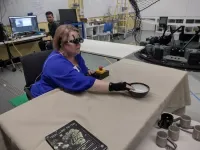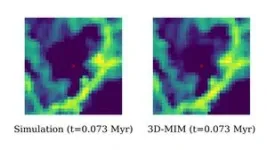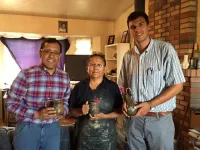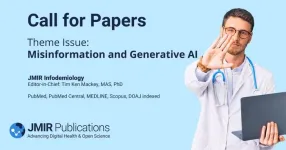(Press-News.org) ustralian researchers have developed cutting-edge technology known as “acoustic touch” that helps people ‘see’ using sound. The technology has the potential to transform the lives of those who are blind or have low vision.
Around 39 million people worldwide are blind, according to the World Health Organisation, and an additional 246 million people live with low vision, impacting their ability to participate in everyday life activities.
The next generation smart glasses, which translate visual information into distinct sound icons, were developed by researchers from the University of Technology Sydney and the University of Sydney, together with Sydney start-up ARIA Research.
“Smart glasses typically use computer vision and other sensory information to translate the wearer’s surrounding into computer-synthesized speech,” said Distinguished Professor Chin-Teng Lin, a global leader in brain-computer interface research from the University of Technology Sydney.
“However, acoustic touch technology sonifies objects, creating unique sound representations as they enter the device's field of view. For example, the sound of rustling leaves might signify a plant, or a buzzing sound might represent a mobile phone,” he said.
A study into the efficacy and usability of acoustic touch technology to assist people who are blind, led by Dr Howe Zhu from the University of Technology Sydney, has just been published in the journal PLOS ONE.
The researchers tested the device with 14 participants; seven individuals with blindness or low vision and seven blindfolded sighted individuals who served as a control group.
They found that the wearable device, equipped with acoustic touch technology, significantly enhanced the ability of blind or low-vision individuals to recognise and reach for objects, without causing too much mental effort.
“The auditory feedback empowers users to identify and reach for objects with remarkable accuracy,” said Dr Zhu. “Our findings indicate that acoustic touch has the potential to offer a wearable and effective method of sensory augmentation for the visually impaired community.”
The research underscores the importance of developing assistive technology in overcoming the challenges such as locating specific household items and personal belongings.
By addressing these day-to-day challenges, the acoustic touch technology opens new doors for individuals who are blind or have low vision, enhancing their independence and quality of life.
With ongoing advancements, the acoustic touch technology could become an integral part of assistive technologies, supporting individuals to access their environment more efficiently and effectively than ever before.
END
Vision via sound for the blind
Smart glasses that use a technique similar to a bat's echolocation could help blind and low-vision people navigate their surroundings, according to Australian researchers.
2023-10-26
ELSE PRESS RELEASES FROM THIS DATE:
New study reveals inequities in access to mechanical circulatory support in US patients with cardiogenic shock
2023-10-26
SAN FRANCISCO – A new study presented today at TCT 2023 sought to evaluate the presence of racial, ethnic, and socioeconomic inequities in access to mechanical circulatory support in the United States among patients with cardiogenic shock (CS). The findings, published in the Journal of the Society for Cardiovascular Angiography & Interventions (JSCAI), revealed stark disparities, particularly among Black patients, that further highlight systemic inequities in access to lifesaving therapies.
CS is a life-threatening condition in which your heart suddenly cannot pump enough blood to meet the body’s needs. As a result, your ...
Breast cancer survivors: New training to treat 'chemo-brain'
2023-10-26
A form of computerised attention and memory training can improve impaired attention and memory issues in women treated for breast cancer, University of Reading researchers have found.
‘Chemo-brain’ refers to cognitive problems like forgetfulness, difficulty concentrating, and lapses in everyday attention, which are common side effects of breast cancer treatments including chemotherapy.
The findings, published in the journal Psycho-Oncology, suggest that an adaptive “dual memory tracking” training program may help breast cancer survivors cope ...
Pottery becomes water treatment device for Navajo Nation
2023-10-26
Large chunks of the Navajo Nation in the Southwest lack access to clean drinkable water, a trend that has been rising in many parts of the U.S. in recent years. A research team led by engineers with The University of Texas at Austin aims to change that.
The team has developed a new water filtration solution for members of the Navajo Nation, lining clay pots with pine tree resin collected from the Navajo Nation and incorporating tiny, silver-based particles that can be used to purify water to make it drinkable.
“Making water filtration technology cheap doesn’t solve ...
AWE launching to space station to study atmospheric waves via airglow
2023-10-26
NASA’s Atmospheric Waves Experiment, or AWE, mission is scheduled to launch to the International Space Station in November 2023, where it will make use of a natural, ethereal glow in Earth's sky to study waves in our planet's atmosphere.
Built by Utah State University’s Space Dynamics Laboratory in North Logan, Utah, AWE will be mounted on the exterior of the space station. From this perch, AWE will stare down toward Earth, tracking undulations in the air known as atmospheric gravity waves (AGWs).
Primarily ...
Research advances toward goal of net zero carbon emissions
2023-10-26
Scientists may be on the verge of taking a big step closer to the net-zero carbon emissions goal, thanks to University of Houston research into algae. Hidden potential is being revealed in the major algae studies at the microbial products lab, located at UH at Sugar Land.
The research project is detailed in a newly published article in Green Chemistry, a journal of the Royal Society of Chemistry.
Venkatesh Balan, associate professor of engineering technology in UH’s Cullen College of Engineering’s Division of Technology, is ...
JMIR Infodemiology call for papers theme issue on misinformation and generative AI
2023-10-25
JMIR Infodemiology Editor-in-Chief: Tim Ken Mackey, MAS, PhD welcomes submissions to a special theme issue “Exploring the Intersection Between Health Information, Disinformation, and Generative AI Technologies.”
JMIR Infodemiology, currently indexed in PubMed Central, PubMed, Scopus, DOAJ, and CABI, is a peer-reviewed premier journal in the field of infodemiology, health information, data science, and misinformation and is inviting submissions from different disciplines of health communication, public health, informatics, data science, social ...
Yale School of Nursing receives historic gift for scholarships
2023-10-25
Yale School of Nursing (YSN) has received a landmark gift — the largest single donation in the school’s history. The $11.1 million gift from a generous anonymous donor was announced on Sept. 21 by Azita Emami, dean of the Yale School of Nursing, at an event kicking off the school’s yearlong centennial celebration (September 2023–May 2024).
This endowed gift will support the YSN Community Scholars program, providing full-tuition scholarships to six students each year in the Master of Science in Nursing ...
Birmingham rare earth magnet recycling technology selected as a Minerals Security Partnership project
2023-10-25
A Principals’ meeting of the Minerals Security Partnership (MSP) has confirmed that HyProMag Ltd, which uses a technology developed by the University of Birmingham’s Magnetic Materials Group has been selected as one of the projects that will help to develop responsible critical mineral supply chains.
Formed in 2022 by 14 governments, the Mineral Security Partnership (MSP) aims to ensure adequate supplies of minerals such as rare earths to meet net zero-carbon goals. It aims to support public and private sector investments building diverse, secure, and responsible global critical minerals supply chains.
HyProMag was one ...
Novel small molecule 5D4 disrupts several molecular pathways, including MYC, that lead to cancer growth
2023-10-25
Researchers at Baylor College of Medicine have identified a small molecule named 5D4 that can suppress the growth of breast and ovarian cancers in animal models. 5D4 works by binding to TopBP1 protein in cancer cells, disrupting its interactions with several pathways that promote cancer growth. Combining 5D4 with another cancer inhibitor, talazoparib, enhances the effectiveness of the anti-cancer activity. The study, published in the Proceedings of the National Academy of Sciences, strongly supports continuing the investigation toward further developing this strategy for clinical use.
“Cancer development involves many steps of genetic alterations and signaling ...
Unlocking pathways to break down problem proteins presents new treatment opportunities
2023-10-25
When targeting problem proteins involved in causing or spreading disease, a drug will often clog up a protein’s active site so it can’t function and wreak havoc. New strategies for dealing with these proteins can send these proteins to different types of cellular protein degradation machinery such as a cell’s lysosomes, which act like a protein wood chipper.
In a new study published in Science on Oct. 20, Stanford chemists have uncovered how one of the pathways leading to this protein “wood chipper” works. In doing so, they have opened the ...
LAST 30 PRESS RELEASES:
Striking genomic architecture discovered in embryonic reproductive cells before they start developing into sperm and eggs
Screening improves early detection of colorectal cancer
New data on spontaneous coronary artery dissection (SCAD) – a common cause of heart attacks in younger women
How root growth is stimulated by nitrate: Researchers decipher signalling chain
Scientists reveal our best- and worst-case scenarios for a warming Antarctica
Cleaner fish show intelligence typical of mammals
AABNet and partners launch landmark guide on the conservation of African livestock genetic resources and sustainable breeding strategies
Produce hydrogen and oxygen simultaneously from a single atom! Achieve carbon neutrality with an 'All-in-one' single-atom water electrolysis catalyst
Sleep loss linked to higher atrial fibrillation risk in working-age adults
Visible light-driven deracemization of α-aryl ketones synergistically catalyzed by thiophenols and chiral phosphoric acid
Most AI bots lack basic safety disclosures, study finds
How competitive gaming on discord fosters social connections
CU Anschutz School of Medicine receives best ranking in NIH funding in 20 years
Mayo Clinic opens patient information office in Cayman Islands
Phonon lasers unlock ultrabroadband acoustic frequency combs
Babies with an increased likelihood of autism may struggle to settle into deep, restorative sleep, according to a new study from the University of East Anglia.
National Reactor Innovation Center opens Molten Salt Thermophysical Examination Capability at INL
International Progressive MS Alliance awards €6.9 million to three studies researching therapies to address common symptoms of progressive MS
Can your soil’s color predict its health?
Biochar nanomaterials could transform medicine, energy, and climate solutions
Turning waste into power: scientists convert discarded phone batteries and industrial lignin into high-performance sodium battery materials
PhD student maps mysterious upper atmosphere of Uranus for the first time
Idaho National Laboratory to accelerate nuclear energy deployment with NVIDIA AI through the Genesis Mission
Blood test could help guide treatment decisions in germ cell tumors
New ‘scimitar-crested’ Spinosaurus species discovered in the central Sahara
“Cyborg” pancreatic organoids can monitor the maturation of islet cells
Technique to extract concepts from AI models can help steer and monitor model outputs
Study clarifies the cancer genome in domestic cats
Crested Spinosaurus fossil was aquatic, but lived 1,000 kilometers from the Tethys Sea
MULTI-evolve: Rapid evolution of complex multi-mutant proteins
[Press-News.org] Vision via sound for the blindSmart glasses that use a technique similar to a bat's echolocation could help blind and low-vision people navigate their surroundings, according to Australian researchers.



